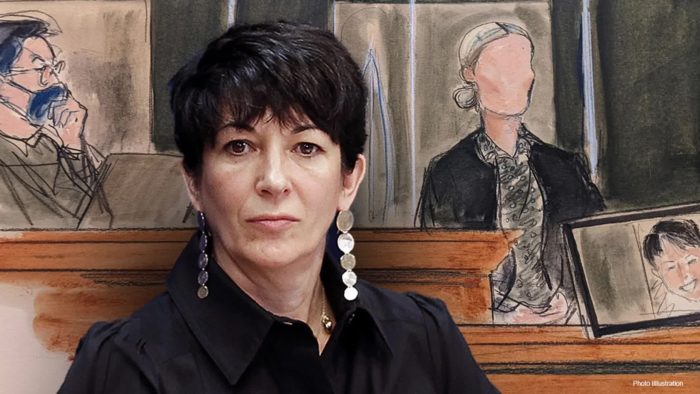Finally, people treating Ghislaine Maxwell as a co-offender acting with independent agency, not a sidekick.
Finally, a media piece treated Ghislaine Maxwell as a full human, not just a sidekick to a man. I’m following up my post Why don’t the media and courts treat Ghislaine Maxwell like an independent woman with agency?.

The new piece is in The Conversation: Ghislaine Maxwell guilty in Epstein sex trafficking trial: What the case revealed about female sex offenders. I know people like to put some people on pedestals and consider others toxic, but some people research what happens and find what happens can differ from people’s stereotypes. This peer reviewed article shows relevant results, Uncovering Female Child Sexual Offenders—Needs and Challenges for Practice and Research:
Estimates of the proportion of sexual abuse committed by women range from 1% when based on conviction rates to 40%, according to some surveys of people who are survivors of sexual abuse.
But arrest and conviction rates may underrepresent the actual number of female sex offenders because those who have been assaulted by a woman are less likely to report the abuse. It is believed this results from social norms that define sexual assault as being perpetrated by men, and rape myths that say boys should always want sex or could not be overpowered by a woman.
Female offenders are also less likely than men to be arrested and convicted. And, if they are convicted, they typically receive shorter sentences than male offenders.
Also
Maxwell a ‘sophisticated predator’
Research shows that women may be involved by recruiting and manipulating the victims into dangerous situations and helping to provide a sense of safety for the victims. They may coerce or manipulate the victim, or behave in sexually abusive ways in front of, or at the same time as, the male abuser.
Victims of Epstein have said that the financier’s female co-offenders – including Maxwell – engaged in all of these forms of abuse.
The three authors of the research paper were all women. I feel comfortable quoting them, but would consider it too risky to my reputation, if before reading the research I had speculated that doing that research might lead to those findings. But I think equality and justice mean deferring to what happens over stereotypes.
The store linked to a relevant other story, Debra Lafave: Why We Can’t See Women as Sexual Predators, and Why It Matters. That “. . . and why it matters” in the title seems to suggest that the concept that we as a society can’t see women as sexual predators still needs justification.
Lafave’s case ignited a debate about whether society is willing to punish sexual misconduct where the defendant is a conventionally attractive woman. Doesn’t every teenage boy fantasize about having sex with his hot blonde teacher?
Christopher Anderson, board member of New York organization Male Survivor, told me that female sexual perpetrators are prosecuted less frequently than their male counterparts, and when they are, they tend to receive more lenient sentences. As evidenced by the the differing sentences outlined above, Anderson further told me that “attractive†female defendants receive more lenient sentences for misconduct than less-attractive ones. Moreover, “press coverage of female teachers abusing male students uses language that minimizes the crimeâ€â€”what’s likely to be described as rape or sexual abuse when the victim is female turns into a “relationship†or “romp.â€
Knowing men who were victims where society didn’t consider their female perpetrators as criminals or them as victims makes reading this piece poignant. I work for equality under the law, which these stereotypes undermine.
How many would acknowledge and question their assumptions versus how many would say, “well year, men are that way, which forces women to be that way”? The piece continues:
Lara Stemple, director of the Health and Human Rights Law Project at UCLA Law and leader of the aforementioned study, told me that “gender stereotypes dictate that women are vulnerable and need of protection,†while men are “sexually insatiable.†Anderson echoed: The “underlying assumptionsâ€â€”that “women can’t be powerful, men are sloppy/lazy/unworthy of being sexually desiredâ€â€”reflect “extraordinarily toxic ideas that infect our culture.â€
Sexual assault specialist Holly Richmond, PhD, told me that our society has trouble seeing women as sexual predators “because…we can’t even see them as sexual beings other than how they have been defined by the traditional male gaze.†She continued, “Women can be sexy, but when it comes to female pleasure for it’s own sake (not her partner’s) and for her own sexual self-efficacy, we tend to take that much less seriously. To give a female sexual predator that much sexual power is culturally antithetical to what we’ve been taught.â€
Given these assumptions, Stemple told me, “Women who perpetrate sexual abuse are more likely to be portrayed as misguided than predatory.â€
I wouldn’t keep writing on this issue except for the tragic inequalities and injustice people seem indifferent to that we could fix.
Read my weekly newsletter

On initiative, leadership, the environment, and burpees